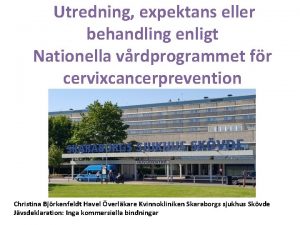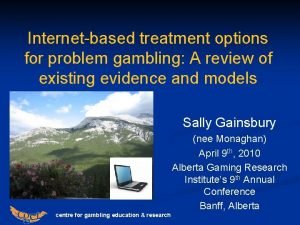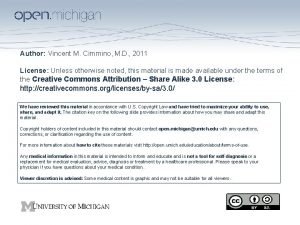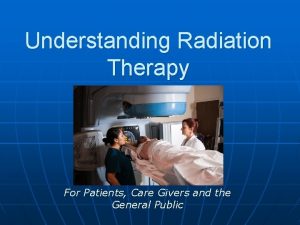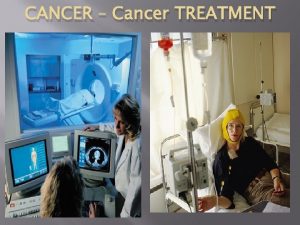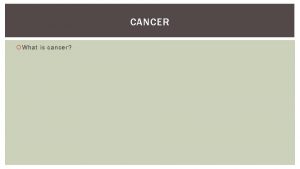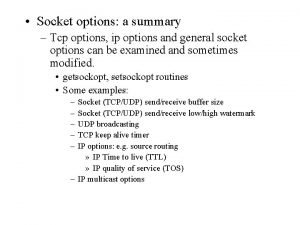Management of cancer Many treatment options for cancer
















- Slides: 16

Management of cancer

Many treatment options for cancer exist, with the primary ones including surgery, chemotherapy, radiation therapy, hormonal therapy, targeted therapy and palliative care. Which treatments are used depends on the type, location, and grade of the cancer as well as the person's health and wishes. The treatment intent may be curative or not curative.

Radiation therapy:

n Radiation therapy: is a local modality used in the treatment of cancer. n Success depend in the difference in the radio sensitivity between the tumor and normal tissue. n It involves the administration of ionizing radiation in the form of x-ray or gamma rays to the tumor site. n Method of delivery: External beam(teletherapy). Internal beam therapy(Brachytherapy).

n Radiation therapy is planned and performed by a team of nurses, dosimetrists, physician and radiation oncologist. n A course of radiation therapy is preceded by a simulation session in which low-energy beam are used to produce radiograghic images that indicate the exact beam location.

n Radiation therapy is usually delivered in fractionated doses such as 180 to 300 c. Gy per day, five times a week for a total course of 5 -8 weeks. n Radiation therapy with curative intent is the main treatment in limited stage Hodgkin’s disease, some NHL, limited stage tumors&CNS tumor. ca prostate, gynecologic

Complication of radiation: n There is two types of toxicity , acute and long term toxicity. n Systemic symptoms such as Fatigue, local skin reaction, GI toxicity, oropharyngeal mucositis&xerostomia. myelosuppression. n Long-term sequelae: may occur many months or years after radiation therapy.

Chemotherapy:

n Systemic chemotherapy is the main treatment available for disseminated malignant diseases. n Progress in chemotherapy resulted in cure for several tumors. n Chemotherapy usually require multiple cycles.

Classification of cytotoxic drug: n Cytotoxic agent can be roughly categorized based on their activity in relation to the cell cycle.

n What is the difference between phase specific & phase non specific? …. . n Phase non-specific: u The drugs generally have a linear dose-response curve( the drug administration , the fraction of cell killed).

Phase specific: Above a certain dosage level, further increase in drug doesn’t result in more cell killing. but you can play with duration of infusion.

Chemotherapeutic agents: Alkylating agents: n Antimetabolites: n Antitumor antibiotic: n Plant alkaloids: n Other agents n Hormonal agent: n Immunotherapy: n

Complication of Chemotherapy: n Every chemotherapeutic will have some deleterious side effect on normal tissue. n E. G; Myelosuppression, nausea&vomiting, Stomatitis, and alopecia are the most frequently observed side effects.

Gene therapy

v. The goal of gene therapy is to replace damaged genes v. For example, researchers are trying to replace the damaged gene that signals cells to stop dividing with a copy of a working gene. v. Gene therapy is a very young field and has not yet resulted in any successful treatments.
 Kolposkopi px
Kolposkopi px Fallahs
Fallahs Treatment options
Treatment options Treatment options
Treatment options Treatment options
Treatment options Treatment options
Treatment options Treatment of inflammatory breast cancer
Treatment of inflammatory breast cancer Cancer treatment
Cancer treatment Options futures and risk management
Options futures and risk management Options futures and risk management
Options futures and risk management Fspos vägledning för kontinuitetshantering
Fspos vägledning för kontinuitetshantering Novell typiska drag
Novell typiska drag Nationell inriktning för artificiell intelligens
Nationell inriktning för artificiell intelligens Vad står k.r.å.k.a.n för
Vad står k.r.å.k.a.n för Shingelfrisyren
Shingelfrisyren En lathund för arbete med kontinuitetshantering
En lathund för arbete med kontinuitetshantering Personalliggare bygg undantag
Personalliggare bygg undantag
